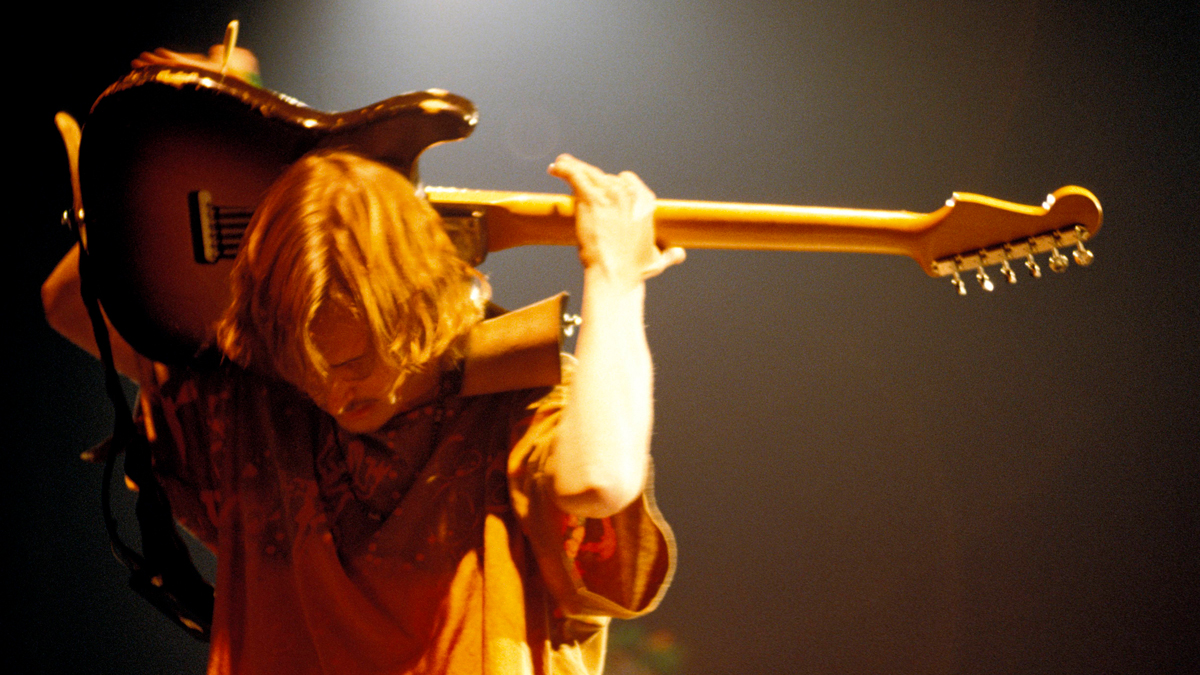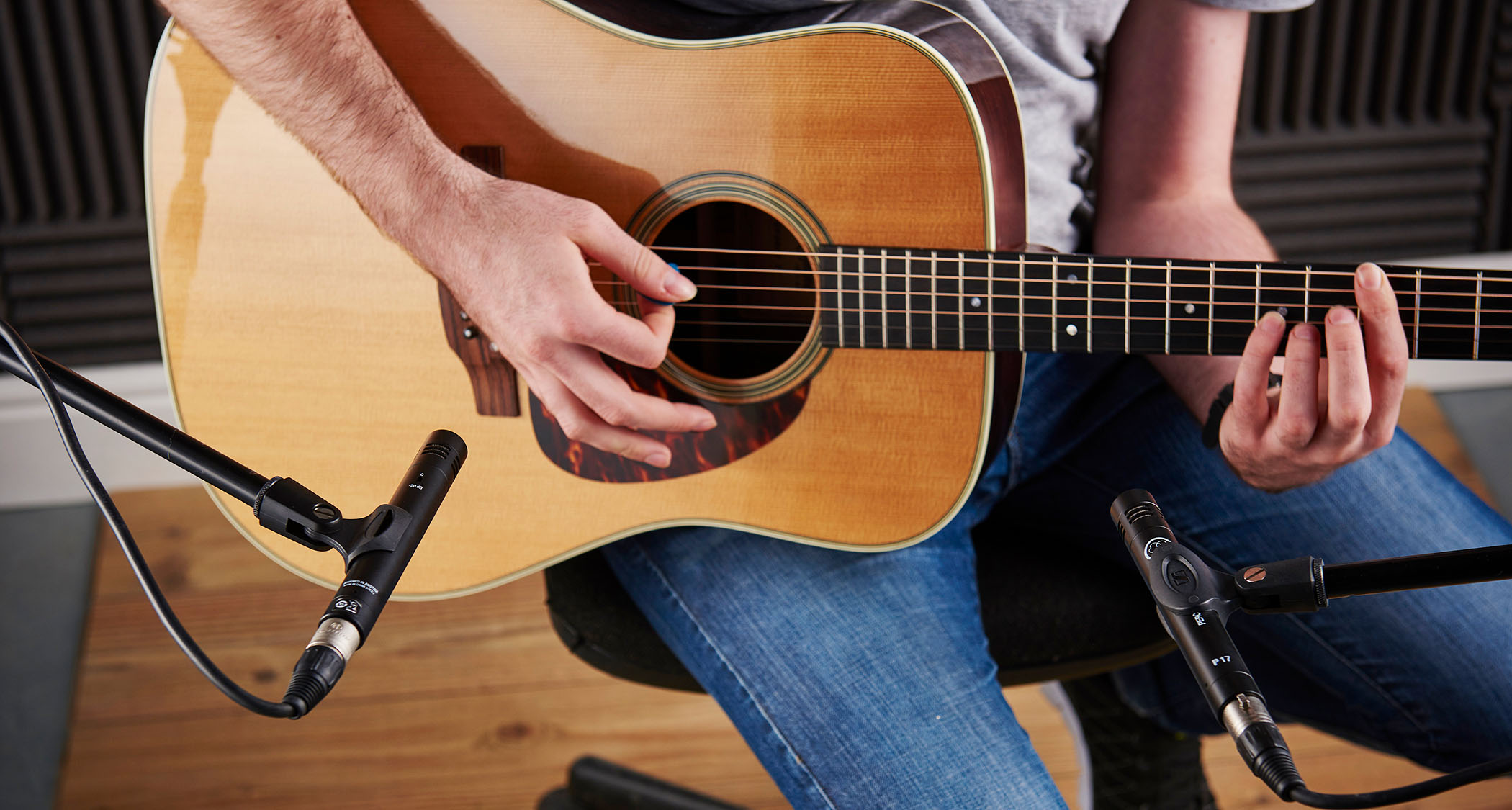Mike McCready breaks down the gear and inspiration behind 15 landmark Pearl Jam tracks
In this classic 1995 interview, the Seattle great details how the tricks he “stole directly from Ace Frehley, Angus Young and Keith Richards” wound up on choice Pearl Jam and Temple of the Dog cuts

This feature was first published in Guitar World magazine in 1995.
“I’m so ignorant of this technical stuff,” says Mike McCready when asked to explain the intricacies of Pearl Jam’s hit-making writing process. “I’ve always done it by ear. Honestly, I’d rather do regular interviews. It’s more interesting to talk about whatever… anything other than guitars. I’m not into being a tech-head.”
He’s just being modest, of course. A guitarist doesn’t reach the top of the rock and roll heap without having a solid acquaintance with his instrument and gear. But then again, that’s what high-paid roadies are for. McCready, an accomplished musician, is not ashamed about being technically challenged. He prefers to concentrate on the more visceral aspects of rock guitar. Like stealing riffs.
“Everything I know, I stole directly from Ace Frehley, Angus Young and Keith Richards,” admits McCready. “That’s how you learn. I used to sit for hours and copy every lick on those early AC/DC and Kiss records. From there I went on to Eric Clapton and Stevie Ray Vaughan. After a while, you kind of develop your own style.”
Here are a few examples of McCready’s best thievery.
1. Reach Down (Temple of the Dog, 1990)
“That was my first lead on an album, and I was so excited. I’d been in a studio before, but never to record an album or anything. I did that in one take! I soloed through the whole thing and ended up with the headphones wrapped around my face. I was totally flushed. The guitar work on that track represents one of my proudest moments.”
2. Hunger Strike (Temple of the Dog)
“I remember thinking that this was a really beautiful song when I heard it. Chris Cornell showed me the riff. I had a ’62 reissue Strat and I wanted to use the fourth-position tone setting – between the bridge and the middle pickups – for the beginning of the song because I like that softer sound. Then I kicked it to the front pickup for the heavier part of the song. This is one of many amazing songs written by Chris.”
All the latest guitar news, interviews, lessons, reviews, deals and more, direct to your inbox!
3. Even Flow (Ten, 1991)
“That’s me pretending to be Stevie Ray Vaughan, and a feeble attempt at that. Stone [Gossard, guitarist] wrote the riff and song; I think it’s a D tuning. I just followed him in a regular pattern. I tried to steal everything I know from Stevie Ray Vaughan and put it into that song. A blatant rip-off. A tribute rip-off, if you will.”
4. Alive (Ten)
“I copied Ace Frehley’s solo from Kiss’s She, which was copied from Robby Krieger’s solo in the Doors’ Five to One.”
5. Why Go (Ten)
“The thing I remember most about this song is how thunderous Jeff Ament’s huge 12-string bass was, and me getting to noodle over it. He had just gotten the Hamer Tom Petersson model, and Why Go was the first song he used it on. It sounded like a piano in your face. It was pretty intense.”
6. Black (Ten)
“That’s more of a Stevie rip-off, with me playing little flowing things. I was way into that trip – I still am, actually, but it was probably more obvious back then. I really thought the song was beautiful. Stone wrote it and he just let me do what I wanted.”
7. Dirty Frank (single, 1992)
“This is a song about our illustrious first bus driver, who we were convinced was a serial killer. [Laughs] It came out of a jam we had at a soundcheck when we were touring with the Red Hot Chili Peppers. We were influenced by their funky jamming; maybe it’s an homage. Eddie [Vedder, vocals] came up with the lyrics.
“We’ve tried to play it live a couple of times since, but it never works. I’ve heard it on bootlegs and it’s really bad. The recorded version is cool, but we never did it right again.”
8. Breath (Singles soundtrack, 1992)
“That was a really old song of Stone’s from his days in Mother Love Bone. It was just another chance for me to do a lot of leads. The song was kind of cool at the time because it reminded me of performing. For me, it was about playing live.”
9. Animal (Vs., 1993)
“I like the lead on that. George Webb, a guy who takes care of all our guitars and amps, was sitting there and I told him I’d do a solo for him. It ended up being the one we used on the record. I did it on a Gibson 335. That’s a fun song to play.”
10. Glorified G (Vs.)
“I wrote part of that one. I had this Gretsch Country Gentleman and I started jamming on this little thing in D [sings riff]; the riff just came out of that. Stone came up with his weird part. There were all these strange, disjointed parts that kind of turned into a song. Stone’s doing something weird, Jeff’s doing something weird and offbeat, but for some reason it works. I really don’t know why.”
11. Spin the Black Circle (Vitalogy, 1994)
“That’s me trying to do Johnny Thunder leads. I actually overdubbed those leads, but when I do it live, that riff is so hectic and frantic, I have to be warmed up or it sounds really shitty.”
12. Not for You (Vitalogy)
“Tom Petty sent me this amazing 12-string Rickenbacker, and Not for You was the first time I used it. It was like a Christmas present. One day it just showed up at my door. I called him up and thanked him. But it’s a cool song – an Eddie song.”
13. Tremor Christ (Vitalogy)
“I wrote part of that one. It’s kind of an odd, marching Beatles tune. It’s just a strange song. It was written in New Orleans. The groove reconciles itself after you get into it.”
14. Satan’s Bed (Vitalogy)
“That’s another Stone song. The solo is definitely my tribute to Angus Young; I was trying to do my Angus thing. I’m sure Eddie won’t like reading that.” [Laughs]
15. Catholic Boy (Basketball Diaries soundtrack, 1995)
“Jeff and I did that song with Jim Carroll, who wrote the song and the book the movie is based on. Jim came out to Seattle and Chris Friel, a friend of mine [from McCready’s high school band, Shadow], played drums. Eddie plays guitar, Jim sings, I play guitar, Jeff plays bass – Stone was off doing something else. We cut it at Bad Animals Studio in a day. We got to hang out with Jim Carroll all day. He’s so cool.”














